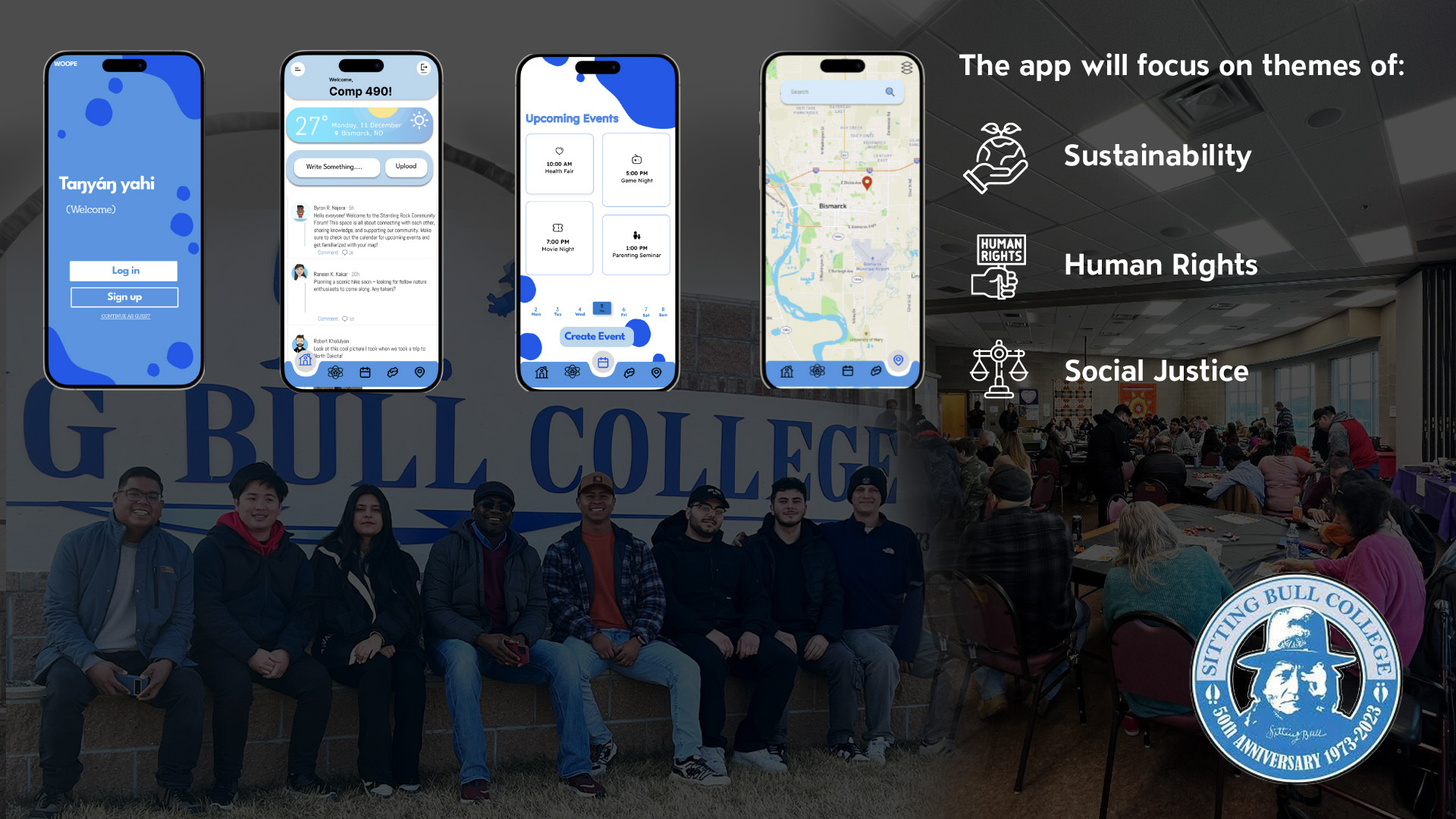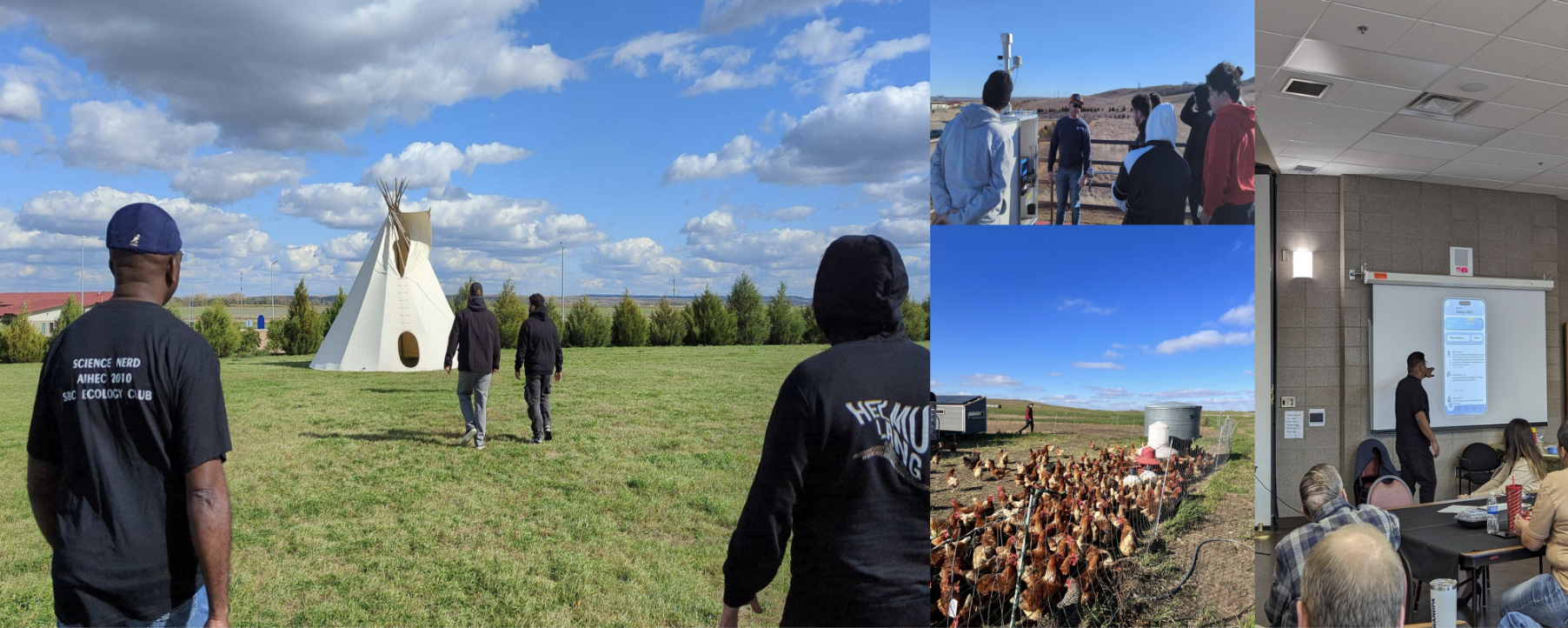Research Project
Citizen Science: Building A Mobile App for
Standing Rock Sioux Nations
Research Team
Lead Researchers:
- Dr. Alex Modarresi, Comp Sci*
- Dr. Nhut Ho, Mech Engr*
- Dr. Bingbing Li, Manufacturing Systems Engr & Mnmt*
- Dr. Mario Giraldo
Note: names marked with an asterisk (*) indicate current researchers
Collaborators:
- Dr. Mafani Mongoh
- Bridget Eagle
- Fred McLaghlin
- Alayna Eagle Shield
- Zane Prentice
- Sunshine Claymore
Student Team:
- Teo Dominguez, BS Computer Science*
- Samuel Guinto, BS Computer Science*
- Nicholas Rodriguez Weda, BS Computer Science*
- Keaton Maki, BS Computer Science*
- Pragya Sangwan, BS Computer Science*
- Yash Desai, BS Computer Science*
- Martin Dela Cruz, BS Computer Science*
- Grant Freedman
- Josue Sanchez
- Robert Khalulyan
- Mike Agazarian
- Byron Mungia
- Dakota Wagner
- Emiliano Viernes
- Raneen Kakar
- Alessandro Pelayo
- Samuel Hernandez
- Christian Foster
- Sheng Yoong
- Nicholas Serce
Note: names marked with an asterisk (*) indicate current students
Funding
- Funding Organization:
- Funding Program:
SYNOPSIS
- Develop a mobile app integrating traditional knowledge with NASA
and EPA. - Empower community members in data collection, improve environmental data accuracy, and promote sustainable practices as a model for other Indigenous communities.
- Conduct workshops for community input, collaborate with NASA and EPA, and launch a pilot app with ongoing support and evaluation.
Abstract
Harnessing the power of citizen science, our project aims to build a mobile application tailored to the specific needs and aspirations of the Standing Rock Native Nation, located in the North and South Dakotas, along with assisting to improve NASA JPL’s accuracy and quality of data. Integrating traditional and cultural knowledge with scientific data and research from NASA and EPA, the app will focus on themes of sustainability, human rights, and social justice. By empowering community members to actively collect data and share knowledge, the platform encourages participation and informed decision-making. Beyond fostering engagement and promoting sustainable living, the app ultimately seeks to revitalize social and cultural identities within the Standing Rock communities, serving as a model for citizen-driven solutions.
Motivation/Research Problem
The development of this app is driven by a critical need to disseminate information within the Standing Rock community. The community faces numerous challenges, from everyday hardships to environmental concerns. While there are many organizations dedicated to providing support and resources, there is a significant gap in visibility and accessibility. Community members are often unaware of the existence of these organizations or unsure of how to access their services. This realization highlighted the need for a centralized platform that not only bridges this information gap but also fosters a stronger sense of community engagement.
Additionally, the app introduces a citizen science component designed to empower community members. By contributing to the collection of critical environmental data — weather, water quality, air quality, and soil quality — residents become active participants in monitoring and preserving their environment. This data will be aggregated, analyzed, and presented back to the community in a way that is understandable and actionable.
Therefore, the motivation behind this app is twofold: to enhance community connectivity and resource access, and to involve community members in significant environmental observation and preservation efforts. By addressing these key areas, the app aims to assist a resilient community by equipping them with the knowledge and tools necessary for their well-being and the protection of their environment


Research Questions and Research Objectives
-
Feature local organizations and their services to ensure community members are aware of and can access available support.
-
Create a dynamic space for residents to connect, share cultural practices, and stay informed about local events, strengthening community ties.
-
Empower residents to contribute to environmental monitoring by aggregating data on weather, water, air, and soil quality to enhance local environmental understanding.
Research Approach
-
Gather input from community members about their needs and preferences for the app.
-
Conduct tests with community members to refine app features and ensure user-friendly navigation.
Research Deliverables and Products
-
The Woniya Wichoni team will use human-centered design and ESG principles to collaborate with Dakota-Lakota Nations on culturally sustaining tools.
-
A software system will collect and analyze environmental data, providing air quality insights, with all data publicly available.
-
A deployable mobile application will showcase this software.
Commercialization Opportunities
-
Application: Community engagement mobile application.
-
Key Values: A mobile platform that integrates cultural knowledge with environmental data.
-
Potential Customers: Members of the Standing Rock Nation.
Research Timeline
Large scale project, the scope is 3-5 years
Start Date: 10/2023
End Date: TBD
Lead Researchers:
- Dr. Alex Modarresi, Comp Sci*
- Dr. Nhut Ho, Mech Engr*
- Dr. Bingbing Li, Manufacturing Systems Engr & Mnmt*
- Dr. Mario Giraldo
Note: names marked with an asterisk (*) indicate current researchers
Collaborators:
- Dr. Mafani Mongoh
- Bridget Eagle
- Fred McLaghlin
- Alayna Eagle Shield
- Zane Prentice
- Sunshine Claymore
Student Team:
- Teo Dominguez, BS Computer Science*
- Samuel Guinto, BS Computer Science*
- Nicholas Rodriguez Weda, BS Computer Science*
- Keaton Maki, BS Computer Science*
- Pragya Sangwan, BS Computer Science*
- Yash Desai, BS Computer Science*
- Martin Dela Cruz, BS Computer Science*
- Grant Freedman
- Josue Sanchez
- Robert Khalulyan
- Mike Agazarian
- Byron Mungia
- Dakota Wagner
- Emiliano Viernes
- Raneen Kakar
- Alessandro Pelayo
- Samuel Hernandez
- Christian Foster
- Sheng Yoong
- Nicholas Serce
Note: names marked with an asterisk (*) indicate current students
Funding
- Funding Organization:
- Funding Program:
